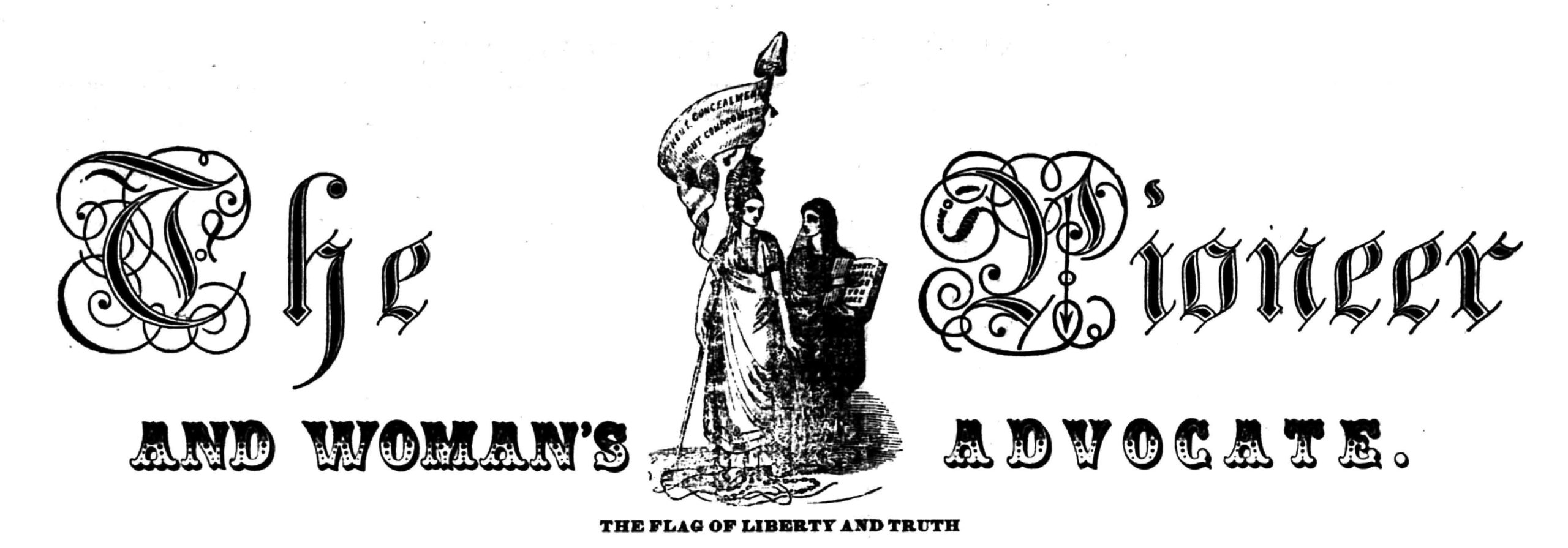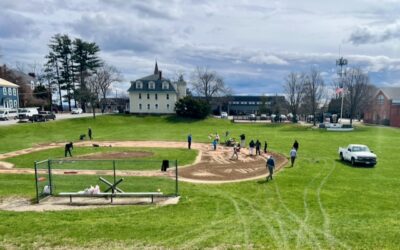Anna W. Spencer of East Greenwich was recently inducted into the Rhode Island Heritage Hall of Fame. Her accomplishments are outlined here by East Greenwich Historic Preservation Society historian Rachel Peirce. Reprinted with permission of the East Greenwich Historic Preservation Society.
By Rachel Peirce
I would never have heard of Miss Anna Waity Spencer, if it weren’t for a passing mention of her in the diary of Harriet Spink (Smith) Davis. On Wednesday, August 30th, 1884, Davis noted: “I met Mrs. Mumford and Miss Anna W. Spencer (Waity). The latter wished me to take a couple of her books: ‘The Pen, and The Sword, The Love of Money and Power,’ a little pamphlet of her own writing. So I shall sometime pay her 20 cents for both. She is quite aged, and is a sister of the late Captain Joseph Spencer, ‘head of the cove,’ so called.”
Who was this elderly lady handing out literature to ladies on the street? Miss Spencer has proved to be a very elusive subject. Yet some clues in Mrs. Davis’ entry helped to shed some light on Waity, particularly naming her brother as Captain Joseph Spencer. Thankfully, Capt. Spencer was a well known figure in East Greenwich. He was also the father of Capt. Obidiah B. Spencer, who was famous locally because of his close friendship with the royal family of Hawaii (where he resided for many years). [See “Our Hawaiian Connection” in the November 1981 EGHPS Packet Vol. 5 No. 4.] His obituary noted: “For a score or more years he had made his home on the Old Homestead near the Head of Greenwich Cove in the Potowomut section of Warwick.”
Waite Spencer (1799-1884)
A Joseph Spencer was born December 23, 1792, to Thomas and Mary Spencer in Warwick. Furthermore, a daughter named Waite Spencer was born on October 10, 1799, to Thomas and Mary.[1] The Spencer family were members of the Religious Society of Friends. Capt. Joe described attending a Quaker meeting in the East Greenwich Meeting House in the History of the Town of East Greenwich by Daniel Howland Greene M.D.
Waity A. or Anna W. Spencer
Some confusion arises regarding her name. Her probate records[2] seem to indicate her legal name was Waity A. Spencer, noting all instances of “Anna W.” were crossed out and replaced with “Waity A.” Perhaps she preferred to be called Anna. But there is no question, Waity A. or Anna W. Spencer was a woman far ahead of her time. She was an activist and at the forefront of the anti-slavery, women’s rights and temperance movements in Rhode Island.
 In the October 27, 1837, issue of The Liberator, Miss Waity A. Spence[r] was listed as a member of the Executive Committee of the Providence Female Anti-Slavery Association, which was organized June 21, 1837. The Liberator (1831–1865) was a weekly abolitionist newspaper, printed and published by William Lloyd Garrison.
In the October 27, 1837, issue of The Liberator, Miss Waity A. Spence[r] was listed as a member of the Executive Committee of the Providence Female Anti-Slavery Association, which was organized June 21, 1837. The Liberator (1831–1865) was a weekly abolitionist newspaper, printed and published by William Lloyd Garrison.
The 1838 Anti-Slavery Association Convention of American Women
The first Anti-Slavery Convention of American Women was held in New York in 1837. While we don’t know if Waity attended the first convention, she did attend the second in May 1838, held in Philadelphia, Penn., in the newly constructed Pennsylvania Hall. In a letter from John Quincy Adams, he noted: “The Pennsylvania Hall Association have erected a large building in your city, wherein liberty and equality of civil rights can be freely discussed, and the evils of slavery fearlessly portrayed.”[3]
Harriet L. Truesdell[4] and Waity A. Spencer, both of Rhode Island, were appointed to the Business Committee of the Anti-Slavery Convention of American Women on May 15, 1838. Some truly notable American women were also in attendance, including Lucretia Mott, Sarah Grimke, Lydia Maria Child, and Abby Kelly.
However, the 1838 Anti-Slavery Convention, in Philadelphia, was marred by protests and violence, spurred by racial tensions. The meetings were well attended by a mixed audience of whites and blacks. On the night of May 17, 1838, a mob congregated outside the hall. A riot broke out and the newly built hall was burned to the ground by an angry mob.[5]
It must have been a very unnerving time for a Quaker woman from Rhode Island. And it certainly must have made an impact on Waity/Anna Spencer.
 Racism and Sexism
Racism and Sexism
The Women’s Suffrage movement had its roots in the abolition movement. Ira V. Brown notes in the article: “Racism and Sexism: The Case of Pennsylvania Hall”: “A neglected characteristic of the Garrisonian abolitionists, reviled by so many historians as fanatical troublemakers, is that they stood wholeheartedly for racial integration and women’s liberation. They stood not only for the elimination of slavery but also for the granting of equal rights to Negroes once they were free; in addition, they stood for equality of the sexes. It was the practice of these principles which provoked one of the most notorious examples of anti-abolitionist violence – the burning of Pennsylvania Hall in Philadelphia on May 17, 1838.”[6]
The Pioneer and Woman’s Advocate
On June 5, 1852, Anna W. Spencer published the first issue of The Pioneer and Woman’s Advocate. Anna described her endeavor and her beliefs: “Every cause which aims at great results, for good or evil, seeks its support in the strong arm of the Press. One of the greatest questions of this age is that of woman’s Rights. Papers devoted to other reforms have, to limited extent, advocated the elevation of woman to her rightful rank by the side of man. But woman has not, in this country, a paper, devoted to her cause in this broad sense – this comprehensive view, which now everywhere is taking possession of the minds of this generation …”
“… We are aware of the magnitude of our undertaking, and of the difficulties in our way … we shall discuss the subject of woman’s oppression and degradation by the character of labor to which she is subjected, the beggarly wages paid her… excluding her from the higher institutions of learning… The disabilities and legal burdens which society imposes upon woman shall be laid bare to the view of those whose right it is to claim equal justice to all.”
“These wrongs will continue until women demand their redress. Who better than herself can press that demand? – They who have not the heart and the will to demand their own rights, have little cause to complain of their loss.”
A short time since, it was deemed improper for a woman to speak in public (except among the worthy Society of Friends) – The Pioneer and Woman’s Advocate, 1852
The book History of Woman Suffrage, Volume I, edited by Elizabeth Cady Stanton, Susan B. Anthony, and Matilda Joslyn Gage, published in 1881, noted in the chapter “Woman in Newspapers” that: “In 1852, Anna W. Spencer started the Pioneer and Woman’s Advocate, in Providence, R.I. Its motto was, ‘Liberty, Truth, Temperance, Equality.’ It was published semi-monthly, and advocated a better education for woman, a higher price for her labor, the opening of new industries. It was the earliest paper established in the United States for the advocacy of Woman’s Rights. In 1853, The Una, a paper devoted to the enfranchisement of woman, owned and edited by Paulina Wright Davis, was first published in Providence, but afterward removed to Boston, where Caroline H. Dall became associate editor.”
The Pioneer was printed by A. C. Greene. Albert Crawford Greene was the nephew of William Northup Sherman, who founded The Weekly Pendulum in East Greenwich in 1854.
The Radical Women’s Press of the 1850s, by Cherise Kramarae and Ann Russo, points out that The Pioneer was published for “at least a year from June 5, 1852, to March 26, 1853.” They also note: “her work was difficult due to her mother’s illness and lack of funds to keep the paper going.”
Anna’s mother, Mary (Vaughn) Spencer, passed away on May 4, 1853, at the age of 89. The last known issue of The Pioneer was published on March 26, 1853.
But in September, 1853, Anna traveled to New York to attend The Whole World’s Temperance Convention, held at Metropolitan Hall in New York City. She served as a Rhode Island delegate.
Miss Spencer kept up her work in the woman’s rights movement, long after she ceased publishing The Pioneer. In the July 1880 issue of The National Citizen and Ballot Box (Matilda Joslyn Gage, editor and publisher, Syracuse, New York), under the heading “Women’s Reasons for Desiring the Vote,” Anna voiced her reasons, along with two other Rhode Island women, Esther B. Carpenter of Wakefield and Catherine C. Knowles[7] of East Greenwich. She would have been over 80 years old at this time, and she was still arguing for women’s rights! She also wrote several patriotic poems during the Civil War. (See bottom.)
“I want the ballot for liberty, truth and right. Who shall say that I shall not be my own master? While the license law is sweeping over us, where is our remedy without the ballot? – Anna W. Spencer, East Greenwich
She was enumerated in the 1880 United States Census: Anna W. Spencer, 81, in East Greenwich, R.I. She was living in the same dwelling house with Marcy Baker, 66, Sarah A. Spencer, 81, Mary A. Knowles, 12.
In 1881, she published “The Pen and the Sword, or the Love of Money and Power.” The Rhode Island Pendulum ran a short notice on July 22, 1881 “… a pamphlet of 32 pages, by Anna W. Spencer, representing a metaphorical controversy between General Penman and General Swordman, each speaking alternately and advocating their respective views. They discuss intemperance, fashions, nobility, the state of society, and other matters, until finally the disciple of Mars declares himself vanquished and retires in a maze of confusion while the palm of victory is awarded the quill-driver.”
Miss Spencer lived a long and meaningful life. She obviously didn’t seek to be in the limelight. Even her death, in 1884, might have gone unnoticed, if not for Mrs. Davis’s diary. On Thursday, November 6th, 1884, Davis wrote: “I called in very briefly at Aunt Mary Smith’s. Left 20 cents with her to pay for the two books I bought in summer of Miss Waity Spencer (familiarly called ‘Aunt Waity’). I was surprised to learn that ‘Aunt’ Waity lies dead, and Aunt was preparing to attend her funeral this very afternoon. It seems she took cold. Mrs. Elder Baker has cared mostly for her. Mrs. Baker lives opposite Aunt Mary’s, and Miss Spencer lived and died in Mrs. Baker’s house.”
Miss Spencer died in the Oliver Wickes house at 21 Peirce St. in East Greenwich.
EGHPS thanks Russell DeSimone for his assistance with this article, and also for providing the EGHPS with copies of all known issues of “The Pioneer and Woman’s Advocate.” There are printed copies at the Old Jail at the bottom of King Street if anyone wishes to peruse them.






 Subscribe
Subscribe
There are many facets of EG History such as Spencerian Handwriting, Women’s rights from the Spencer family that I have learned and have read information on since my Mothers passing. I enjoyed your article.
The Washington College of Law (WCL) was founded in 1896 by Ellen Spencer Mussey (1850-1936) and Emma M. Gillett (1852-1927). Mussey and Gillett opened the first session of the Woman’s Law Class on February 1, 1896, in Washington D.C. The two did not intend to establish an independent law school but decided to do so when Columbian College (now the George Washington University) would not accept students from the Women’s Law Class into its law school for their final year of education. The Washington College of Law was the first law school in the world founded by women and the first to graduate an all-female law school class. Ellen Spencer Mussey was the first woman dean of a law school. In 1897, the WCL enrolled its first male student. In 1949, the WCL merged with American University.
I have the written Genealogy of where Ellen Spencer Mussey’s family came from the original family of Spencer’s in E.G.
My mother was the Town Clerk in E.G. 9 generations after the first Town Clerk John Spencer and believe me they did not throw away much!
There is a book at Brown University Library about Ellen Spencer Mussey’s life that I have read.